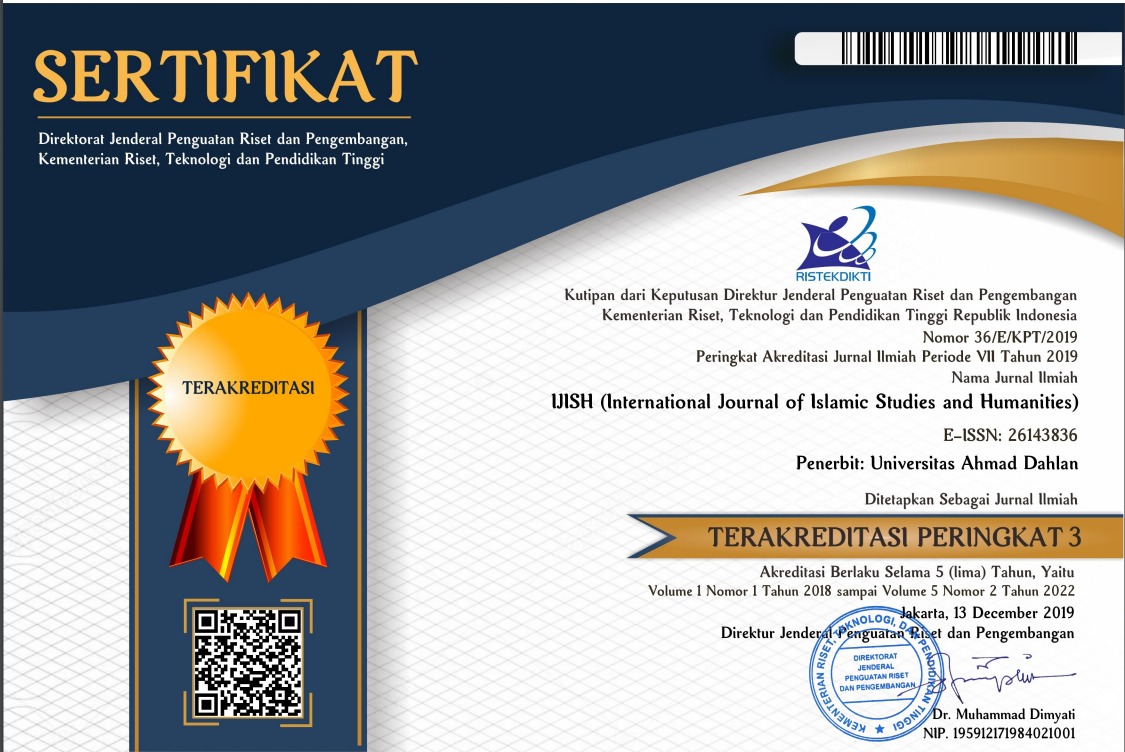Reflection on the State of Islam and Muslim Scholars in Continuing the Islamic Tradition in Arawa Land, Nigeria
DOI:
https://doi.org/10.26555/ijish.v4i2.3563Keywords:
Muslim Scholar, Islamic Tradition, NigeriaAbstract
The study aimed to identify the contributions of scholars on the State of Islam and Muslim Scholars in Continuing the Islamic Tradition in Arawa Land. The paper attempted to brings into limelight the various contributions of Islamic scholars from North Africa (Maghrib) the entrenchment Islamic teachings in Arawaaland particularly the Wangarawa traders and Muhammad Kanta, Askia Muhammad, Muhammad bn Abd al-karim al Maghili. Also discussed in the paper, was the role played by the Sokoto Jihad scholars to the development of Islam and Islamic tradition in Arawa Land. However, the outcomes confirmed that, Arawa Land is currently witnessing the proliferation Muslim scholars and preachers whose proselytization activities have continued to impact positively on the life of the people. The researchers sourced data from the secondary sources as well interview complemented by observation and analyzed them. It is on the basis of such that, the findings of this research have portrayed the various contributions of Muslim scholars to the development of Islam and Islamic tradition in Arawa Land
References
Alkali, M.B., (1969). “A Hausa Community in Crisis: Keffi in the 19th Century”, M.A. Thesis, Ahmadu Bello University Ahmadu Bello University, Zaria, Nigeria.
Augi, R.A., (1984). “Gobir Factor in the Social and Economic History of the Rima Basin c.1650-1808 A.D.”, PhD Thesis, Ahmadu Bello University, Zaria, Nigeria.
Balogun, S.A. (1980). “History of Islam up to 1800”, in O. Ikime (ed.), Groundwork of Nigerian History, Ibadan, Heinemann Educational Books.
BobboyiH., & Yakubu A.M., (eds), (2006). The Sokoto Caliphate: History and Legacies 1804-2004, Vol. I, Arewa House, Kaduna, 2006.
Clarke, P.B., (1982). West Africa and Islam, London. Edward Arnolds, p.1;
Crowder, M., (1968). West Africa under Colonial Rule, Hutchinson Press, London.
Davidson, B., (1969). A History of West Africa A.D 1000 to 1800, London, pp.177-178.
Doi, I.A., (1984) Islam in Nigeria, Gaskiya Corporation limited, Zaria.
Glaser, B., (1963). The use of secondary analysis by the independent researcher. The American Behavioural Scientist 6: 11–14.
Harris, P.G. (1932). Sokoto Provisional Gazetteer, London, pp.261-262.
Heaton, J., (2004). Reworking Qualitative Data. London: Sage Publications.
Hinds, P.S., Vogel, R.J and Clarke-Steffen, L., (1997). The possibilities and pitfalls of doing a secondary analysis of a qualitative dataset. Qualitative Health Research 7(3): 408–424.
Hogben S.J. and Kirk-Green A.H.M. (1966). The Emirates of Northern Nigeria: A Preliminary Survey of their Historical Tradition, London, Oxford University Press.
Horton, R., (1979). “Stateless Societies in the History of West Africa”, in J.F.A. Ajayi, and M. Crowder (eds), History of West Africa Vol. I, Longman, London, pp.123-177.
Kani, A.M., (1983). Intellectual Origin of Sokoto Jihad, University Press, Ibadan.pp.1-3.
Lawal, Y.M., (2016). The Spread and Development of Islamic Civilisation in NorthernNigeria: Case Study of Katsina State. International Journal of Business, Economics and Law, Vol. 9, Issue 5.
M’aluf, L., (1976). Al-Munjid. Arabic Dictionary. Beirut: Dar-al Mashriq.
Maishanu, H.M., (2006). Five Centuries of Historical Writing in Hausaland and Borno 1500 to 2000, Kaduna.
Malam SamoWaliy, (67 years), retired Civil Servant and local historian, interviewed on 12thDecember, 2005, in Sokoto.
Musa, S., (2004). The Contribution of Five Eminent Personalities to Sokoto Jihad, A Seminar Paper Presented at International Seminar on Bicentenary of Sokoto Caliphate 1804-2004, Arewa House, Kaduna.
Nadama, G., (1977). “The Rise and Collapse of a Hausa State: Social and Political History of Zamfara”, PhD Thesis, Ahmadu Bello University, Zaria, Nigeria.
Salihu, S., (2007). “Contribution of Arawa Muslim Scholars to the Development of Islam in Sokoto and Kebbi States”, M.A. Dissertation, Department of Islamic Studies, Usmanu Danfodiyo University Sokoto, Nigeria.
Tsiga, A.I, (1997) Islam and History of Learning in Katsina. Ibadan: Spectrum Books.
Usman, Y.B., (1979). “The Transformation of Political Communities”, in Y.B. Usman (ed.), Studies in the History of Sokoto Caliphate: The Sokoto Seminar Papers, Lagos, pp.35-55.
Yandaki, A.I., (1990). “The History of Izala Movement in Northern Nigeria up to 1989”, M.A. Dissertation, Department of History, Usmanu Danfodiyo University Sokoto, Nigeria.
Yeldu, H.U., (2006). “The Impact of Colonialism on Arawa Muslim Community of Nigeria-Niger Boarders”, M.A. Dissertation, Department of Islamic Studies, Usmanu Danfodiyo University, Sokoto Usmanu Danfodiyo University Sokoto, Nigeria.
Downloads
Published
How to Cite
Issue
Section
License
Copyright (c) 2021 Suwaiba Salihu Kangiwa

This work is licensed under a Creative Commons Attribution-ShareAlike 4.0 International License.
Authors who publish with IJISH (International Journal of Islamic Studies and Humanities) agree to the following terms:
- Authors retain copyright and grant the journal right of first publication with the work simultaneously licensed under a Creative Commons Attribution License (CC BY-SA 4.0) that allows others to share the work with an acknowledgment of the work's authorship and initial publication in this journal.Â
- Authors are able to enter into separate, additional contractual arrangements for the non-exclusive distribution of the journal's published version of the work (e.g., post it to an institutional repository or publish it in a book), with an acknowledgment of its initial publication in this journal.
- Authors are permitted and encouraged to post their work online (e.g., in institutional repositories or on their website) prior to and during the submission process, as it can lead to productive exchanges, as well as earlier and greater citation of published work.

This work is licensed under a Creative Commons Attribution-ShareAlike 4.0 International License.






